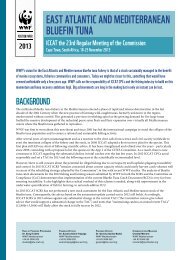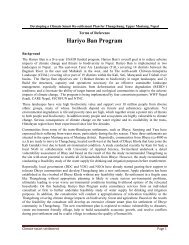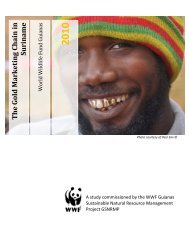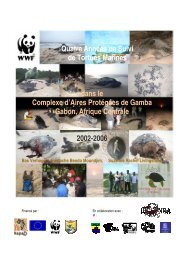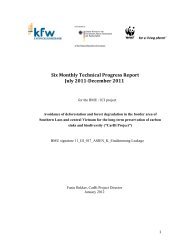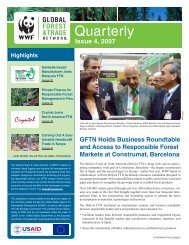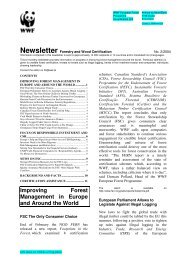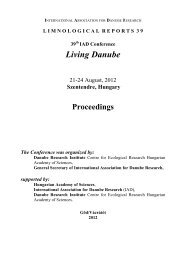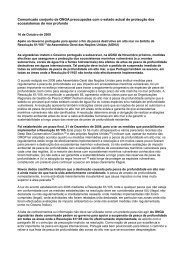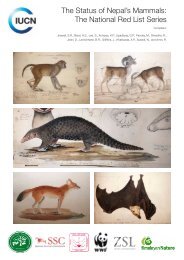The South Africa – Viet Nam Rhino Horn Trade Nexus (PDF ... - WWF
The South Africa – Viet Nam Rhino Horn Trade Nexus (PDF ... - WWF
The South Africa – Viet Nam Rhino Horn Trade Nexus (PDF ... - WWF
Create successful ePaper yourself
Turn your PDF publications into a flip-book with our unique Google optimized e-Paper software.
situation at the source: south africa<br />
• <strong>South</strong> <strong>Africa</strong>n Syndicate #2<br />
In September 2010, the sensational and widely publicized arrests of 11 wildlife industry professionals<br />
forming an alleged rhino crime syndicate began the most notorious rhino crime trial in <strong>South</strong> <strong>Africa</strong> to<br />
date (Naidoo, 2012). It has been reported that between June 2006 and September 2010, “hunters, agents<br />
or middlemen and the buyers started procuring rhinoceros on different game farms, wildlife parks and reserves<br />
across the country with the aim of dehorning them” (Child, 2012b) and that the syndicate “induced other<br />
farmers to dehorn their rhinos or sell their rhino horns”. It is alleged that more than 39 rhinos were killed<br />
on a farm in Limpopo province belonging to one of the syndicate members and the carcasses sold to a<br />
neighbouring farm without their horns (Child, 2012b). <strong>The</strong> 11 accused in the case face a total of 1872<br />
charges that relate to the killing of rhinos, racketeering, money laundering and dealing in rhino horn.<br />
On 9 May 2012, a joint security force made up of the Hawks, the NPA’s Asset Forfeiture Unit and officials<br />
from the Environmental Affairs Department seized assets from the Limpopo properties of three<br />
members of the syndicate in an attempt by the State to recoup the ZAR55 million (approximately<br />
USD7.3 million) that the suspects allegedly made through the sale of the rhino horn (Naidoo, 2012).<br />
All of their assets are effectively frozen until the trial is over and, if they are convicted, the proceeds of<br />
these assets will be used to combat crime (Child, 2012b). <strong>The</strong> trial continues and the next court date is<br />
scheduled for October 2012.<br />
• <strong>South</strong> <strong>Africa</strong>n Syndicate #3<br />
Nine members of one of the most prominent and notorious syndicates, including a <strong>South</strong> <strong>Africa</strong>n<br />
police officer, were arrested in Hazyview, Mpumalanga, near KNP in March 2012 after a sting operation<br />
in which four rhino horns were found in a vehicle (Viljoen, 2012). It was suspected the horns came<br />
from an earlier poaching incident in KNP for which four park staff had been charged (Viljoen, 2012).<br />
Police later found more than ZAR5 million (approximately USD670 000), a variety of firearms and<br />
about 70 pangas, axes and knives hidden at three properties owned by the man believed to be the head<br />
of the syndicate (Naidoo, 2012). <strong>The</strong> trial continues.<br />
• Mozambican Syndicate<br />
On 31 January 2012, three Mozambican nationals (Aselmo Baloyi, Jawaki Nkuna and Ishmael Baloyi)<br />
who had been found guilty of illegally hunting rhinos in KNP were sentenced to 25 years’ imprisonment<br />
each by the Phalaborwa Regional Court. <strong>The</strong> poaching gang had been caught in the Mooiplaas<br />
section of KNP in July 2010, with two fresh rhino horns and an axe, and was also found guilty of possessing<br />
an illegal firearm and ammunition. A fourth member of the gang had attempted to escape from<br />
jail, but was captured and died in custody in 2011. <strong>The</strong> 25-year sentence was due to several of the<br />
charges running concurrently. <strong>The</strong> sentences were: illegal hunting of rhino, sentenced to 10 years’<br />
imprisonment; possession of automatic firearm, sentenced to 15 years’ imprisonment; possession of<br />
a hunting rifle, sentenced to eight years’ imprisonment; and possession of ammunition, sentenced to<br />
15 years’ imprisonment.<br />
• “Pseudo-hunting” Syndicate<br />
A Thai businessman was arrested in July 2011 as the alleged local “kingpin” for a syndicate accused of<br />
sourcing rhino horns for export via “pseudo-hunts”. It is claimed that he has been colluding with a<br />
<strong>South</strong> <strong>Africa</strong>n lion farmer and safari operator to stage legal trophy hunts in North West province<br />
(Rademeyer, 2011d). Seized documents indicated this syndicate had plans to conduct 15 “pseudohunts”<br />
of rhinos each month (Rademeyer, 2011d). <strong>The</strong> syndicate also hired Thai women, some of them<br />
alleged “sex workers”, to pose as hunters. In line with permit regulations, a hunter may shoot one<br />
rhino per year and the women ensured that the syndicate had a ready pool of “hunters” (Rademeyer,<br />
2011e). Another member of the gang was found guilty of the illegal possession of lion bones in June<br />
2011 and he was also charged with the attempted purchase of rhino horn in a sting operation in<br />
September 2008, but was released due to lack of evidence (Appendix 4). A Thai national was arrested at<br />
Emperors Palace Casino in Johannesburg in March 2012 on charges related to illicit rhino horn trading.<br />
Another <strong>South</strong> <strong>Africa</strong>n professional hunter was arrested in May 2012. <strong>The</strong> trial continues.<br />
• <strong>Viet</strong>namese Syndicate #1<br />
In mid-May 2012, a <strong>Viet</strong>namese man was arrested after a tip-off led to a raid on a house in Bedfordview,<br />
Johannesburg (Hosken, 2012). <strong>The</strong> suspect was charged with possession of 10 rhino horns and contravening<br />
endangered species legislation, possession of suspected stolen property and contravening foreign<br />
currency regulations. Police also recovered one elephant tusk, gold jewellery and approximately<br />
ZAR4 million (approximately USD530 000) in various currencies. This individual was viewed as a flight<br />
risk and refused bail. <strong>The</strong> trial continues.<br />
White <strong>Rhino</strong> carcass.<br />
©MARTIN HARVEy/<strong>WWF</strong>-CANON<br />
• <strong>Viet</strong>namese Syndicate #2<br />
Two <strong>Viet</strong>namese men were arrested during a sting operation at the Midrand Golfing Estate in Gauteng<br />
province at the end of May 2012 (Nair, 2012). <strong>The</strong>y were charged with the illegal possession of eight<br />
rhino horns and illegal dealing in rhino horn. It has been alleged they are senior players in a multi-<br />
billion rand international syndicate. Luxury vehicles were seized from the crime scene, together with<br />
electronic scales, laptops, documents and files pertaining to the sale of rhino horn (Nair, 2012). <strong>The</strong><br />
trial continues.<br />
Prosecutions<br />
A variety of legal measures are relevant to the prosecution of individuals charged with rhino crime.<br />
NEMBA and TOPS are two prominent laws used in rhino crime cases, but a range of permit violations<br />
and transgression of CITES are also of importance. Additionally, it is possible to lay charges under the<br />
Health and Medicines Act and the <strong>South</strong> <strong>Africa</strong>n Civil Aviation Authority whenever veterinarians and<br />
pilots transgress these laws (Swart, 2012).<br />
<strong>The</strong> latest statistics for 2012 released by DEA on 21 May 2012 show that a total of 57 cases related to<br />
rhino poaching and rhino horn trade are in the courts at the present time. Of the 161 individuals charged<br />
in 2012, 65 (or 40%) of those accused are held in custody, while the remaining 96 (or 60%) have been<br />
released on bail. In fact, the conviction rate of those charged with rhino crimes in <strong>South</strong> <strong>Africa</strong> is relatively<br />
high. Both private investigators and NPA staff report that more than 90% of those arrested have gone<br />
to court, though cases may take a long time to complete due to lack of national capacity and the complexity<br />
of many syndicate cases, as well as delaying tactics used by defence lawyers and their clients.<br />
Sentencing<br />
When the first rhino horn case was tried in his court in 2010, Magistrate Manyathi of the Kempton<br />
Park Regional Court made a decision that small fines or a “rap over the knuckles” would not suffice as<br />
punishment for rhino crime (Coetzee, 2011). Magistrate Manyathi is reported to have said:<br />
98 the south africa <strong>–</strong> viet nam rhino horn trade nexus TRAFFIC 99



